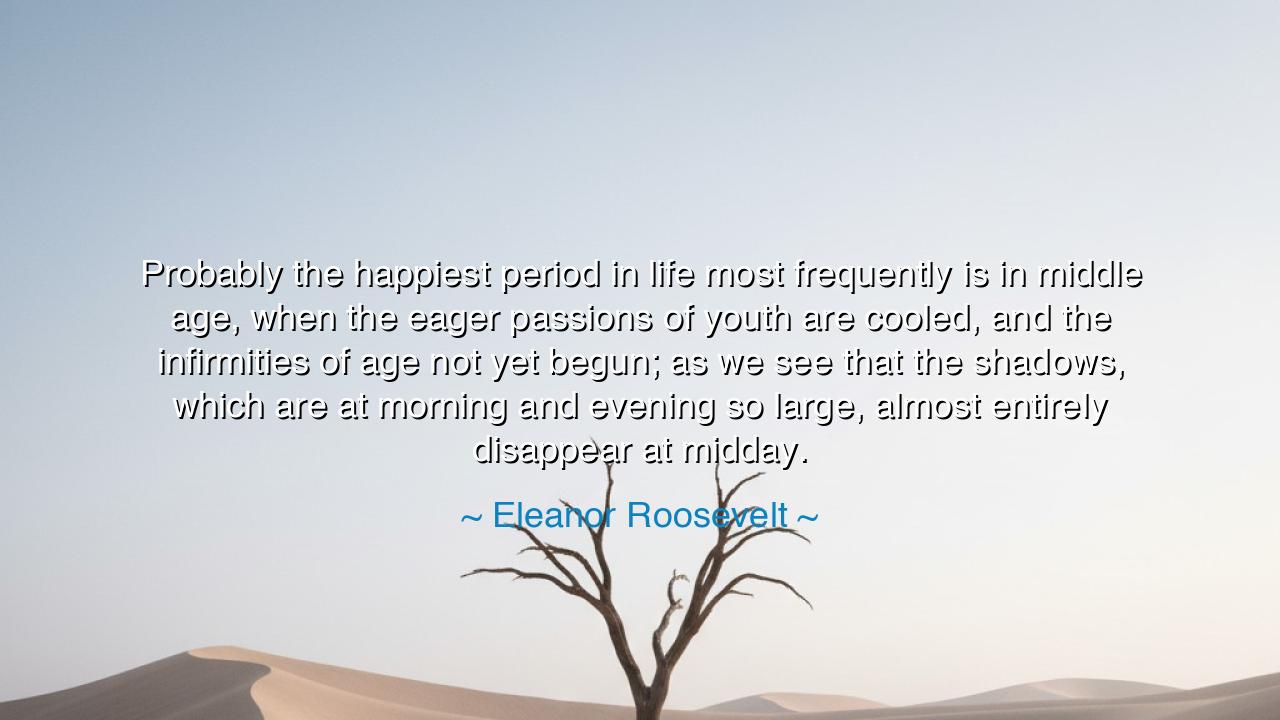
Probably the happiest period in life most frequently is in middle
Probably the happiest period in life most frequently is in middle age, when the eager passions of youth are cooled, and the infirmities of age not yet begun; as we see that the shadows, which are at morning and evening so large, almost entirely disappear at midday.






"Probably the happiest period in life most frequently is in middle age, when the eager passions of youth are cooled, and the infirmities of age not yet begun; as we see that the shadows, which are at morning and evening so large, almost entirely disappear at midday." - Eleanor Roosevelt. In this reflection, Roosevelt speaks to a profound truth about the nature of life and the passage of time. Middle age, she suggests, is not a time of loss or decline but a period of balance and clarity. Unlike the passions of youth, which burn hot and fierce but often lack direction, and the infirmities of age, which cast a long shadow over the twilight years, middle age represents a time when we have learned to moderate our desires and can look at the world with a sense of equanimity and wisdom. It is a moment when life's most difficult questions are met with a calm mind, and the storms of youth have given way to the stillness of midday.
Consider the life of Socrates, who, though often associated with his youth as a warrior, achieved his greatest accomplishments in his middle years. His thoughts, his teachings, and his wisdom did not emerge from the wild passions of early life but from the reflective clarity that comes with age. By the time he entered his later years, he had learned to balance the passions of the soul with the demands of intellectual inquiry. Socrates’ life illustrates Roosevelt’s point that middle age is a time of both consolidation and harmony, where the individual can engage in deep reflection without the recklessness that often defines youth, nor the physical decline that marks old age.
Roosevelt’s metaphor of the shadows disappearing at midday carries a profound visual and philosophical weight. The shadows that lengthen at morning and evening represent the uncertainty and extremes of the human experience. In youth, our passions can be exaggerated and chaotic, while in old age, we face the looming shadows of decline and the inevitable end. But at midday, those shadows are at their smallest, representing a time of balance and clarity, when we can see the world for what it truly is, free from the illusion of youthful ambition or the dread of aging. This is the essence of Roosevelt’s teaching—middle age offers us the rare gift of perspective, a time when we have the energy of youth but the wisdom to use it more judiciously.
Take, for example, the life of Benjamin Franklin, who, in his middle years, was able to combine the passion of youth with the wisdom of age. Franklin, in his later middle age, became a statesman, diplomat, and inventor, leveraging his experiences and talents to shape the future of a new nation. His middle years were marked by a sense of purpose and achievement, but also by a clarity of vision that allowed him to work for the common good with far less personal ambition than in his earlier years. Franklin’s life shows that, like the midday sun, middle age offers us a time to reap the benefits of the experiences we have gained without the distractions of youthful fervor or the burdens of physical decline.
Roosevelt’s insight also invites us to think of middle age not as a period of decline but as a time of maturity and achievement. The challenges of youth—energy without direction, passion without purpose—are tempered with the wisdom that comes from lived experience. We have learned, through both success and failure, how to navigate the world. We understand more clearly what matters in life and what does not, and we begin to take on roles that allow us to contribute meaningfully to the world around us. In this sense, middle age is not a decline but a summit, a peak where we can survey the landscape of our lives and see it with clearer eyes.
Thus, the lesson to take away from Roosevelt’s words is this: embrace middle age as a time of wisdom and clarity. It is a period when you have the strength and insight to make a lasting impact, but also the peace that comes from understanding that you no longer need to prove yourself. Use this time to cultivate your talents, build meaningful relationships, and contribute to the greater good. The passions of youth may fade, but the purpose of middle age is to live fully with the wisdom gained from experience. Middle age is not to be feared, but celebrated as a time when the shadows of confusion and uncertainty fade, and we can stand tall in the light of our achievements and our understanding.
The practical action we must take is to cultivate balance in our lives. We must learn to moderate our passions, to reflect on our past, and to approach the future with purpose. Take time to evaluate your life—where you have been, where you are going, and how you can make the most of the years ahead. Don’t be consumed by the anxiety of aging or the impetuousness of youth. Instead, learn to walk the path of middle age with grace, knowing that this is the time to build on what you have already accomplished and make your mark on the world in a more meaningful way.






AAdministratorAdministrator
Welcome, honored guests. Please leave a comment, we will respond soon